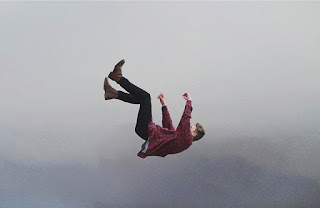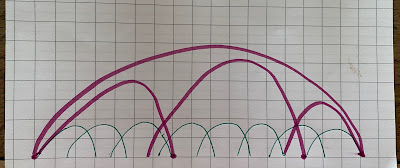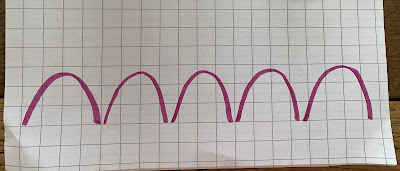Here's the second of our two first important rules on page turning and it's one that everyone I know totally struggled with, especially when we were all at the beginning. It's about .... well, I'll tell you in a second.
Let's get one really important other rule on the table first. Your reader must never think you're finished.
If it sounds like something's come to a tidy end, then your reader is already putting the book down. It's like going quiet in a music performance and everyone starts clapping politely - then you jump up and say, hang on, no, there's more.
It's easily done too, because we all like to put a neat ending on things. We want to get to the ending ourselves and so our characters get pushed into loads of endings. I used to have a real habit of lingering at chapter ends bringing an episode to a luxurious rest. Basically letting your Main Character have a bit of a lie down after the busy episode.
But no. Your Main Character can never rest. They can never look like the journey's over.
So, we've seen first rule of page-turn-ability and it was giving the reader unanswered questions.
The next rule is about action - the actions your character is taking.
There must always be something unfinished.
Of course real people are finishing things all the time. Make a tea. Recharge the phone. Complete the homework.
These aren't great features of a gripping story for all sorts of reasons and we might choose not to have our Main Character do anything so swift and banal. Things like this might be labeled ACTIVITY rather than ACTION. They tend to crop up when people want a character to do lots of prattle or musing.
But some major actions suggest an implicit, in-built onward motion. They're naturally part of bigger ACTION EXPECTATIONS: putting the gun in the handbag, a mistaken kiss.
These are what major story action is built from.
When one action finishes, it must either be part of a bigger action expectation (and you'll need that type particularly at the beginning.) Or, you must have some other actions ripe and unfinished in the reader's mind.
It's like a set of chain links. A new action must begin before the last one's finished.
You'll maybe find some bigger arches too, ones that go over several others. You shouldn't have too many arches ending at the same point until the very end.
If you find you get passages that are stop start...
then see what you can do to build something else in a bit earlier.
Unfinished actions in storytelling
As a reader, you'll want to see how an unfinished action finishes, especially if the implications are strong. You'll happily turn a page to find out. Your job as a writer is to get another unfinished action in there before the reader gets the satisfaction of the ending she's gone looking for.
As with anything in story, there are magnitudes of action. How a swooping axe finishes is different from how a search for the remote control finishes. The principle though is the same:
Don't let it look like your Main Character has come to rest.
There is such thing as 'potential' of course, as you'll remember from physics lessons. A ball rocking at the top of a hill may not be moving very much yet, but it can't stay there for long. Your big action can be something that WILL HAVE TO BE DONE - preferably very soon.
So here's a classic cartoon example:
- Massive round rock is teetering on the top of a hill.
- Main Character is building a house at the foot of the hill
- Main Character puts final touch to the roof.
- Ball's headed this way.
You get the idea. And if we add something else into the house activity, so that, say, there's a letter delivered to the doorstep with URGENT written on it. We've got another unfinished action to get going with once the ball's hit the house.
- Ball's bound to start rolling down hill.
- Main Character is building a house.
- Letter comes with URGENT.
- Main Character puts final touch to the roof.
- Ball's headed this way.
- Letter's being opened....
You can plan this or you can pants it. Same with anything, but when you look back at your plan or your manuscript, see if you can make a diagram of beginnings and ends out of your story.
Hopefully you'll see a set of arches that overlap like the ones above.
Or to leap on another metaphor, keep the plates spinning. Keep asking yourself what you've got in the bag still that's unfinished and - if necessary - give your reader a few reminders that it's there.
There's a name for this kind of unfinished action. The professional story tellers call it 'unresolved'. And when we look at 'scenes' we'll get to see the great threesome of dramatic action: crisis, climax, resolution.
Can't wait.



Comments
Post a Comment